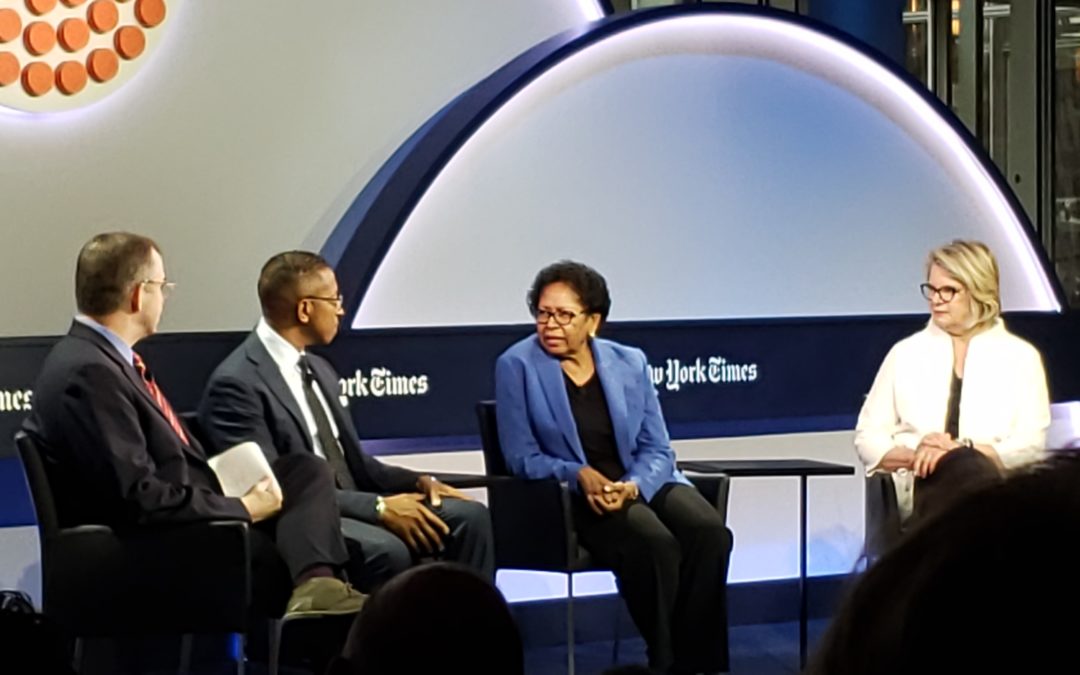Recently, I spent time in New York City learning from the brightest voices from inside and outside of higher education at the New York Times Higher Ed Leaders Forum. Over 300 professionals from all over the country convened to discuss the current state of higher education. Speakers were a diverse group of who’s who and included: Senator Lamar Alexander of Tennessee, Wes Moore, CEO of Robin Hood, and Margaret Spellings, former secretary of education under the Bush administration. Spellings is currently the University of North Carolina System president. While the themes of the conference varied, two themes almost immediately stuck out. The first was narratives matter. Colleges and universities market well, sell education as a product well, but they do not tell their stories well. Many have failed to create a concrete and coordinated vision of what higher education looks like for the average American and why it is still important. Also noteworthy and troubling, many institutions just don’t know their student populations with certainty. As a result, the average American still assumes that the majority of college students are in the traditional 18-24 year old age range and attend a residential college.
Takeaways from this event:
- First, too much of the mainstream national discussion around higher education is focused on issues like free speech and expression, hazing, and academic freedom. According to NYT Higher Ed Leaders Forum speaker: Dr. Sara Goldrick-Rab, “the attention is misplaced” as these areas affect a small number of students.
- Former Mayor of NYC, businessperson, and philanthropist, Michael Bloomberg pledged $375 million dollars through grants focused on research, direct action, and collective understanding to better prepare students for college or the workplace.
- Futurist Simon Sinek shared five steps for mastering the “Infinite Leadership” problem.
- Dr. Khalil Gibran Muhammad reminded attendees that diversity cannot be a checked box. Muhammad suggested “colorblindness is not a virtue but a deficiency.”
- Dr. Sara Goldrick-Rab introduced food as a higher education innovation. Today 36% of university students and 50% of community college students are food insecure. Students cannot learn, if they are hungry.
- Goldrick-Rab’s points were amplified by Dr. Ruth Simmons, Prairie View A&M’s President when she announced “a new tire or paying the electric bill can be more of a barrier to college completion than paying for tuition.”
Attendees were encouraged to:
- Find your “just cause”.
- Spend time and energy creating “vulnerable teams” capable of working through mistakes and victories.
- Identify a “worthy adversary” with which you can compete and learn.
- Compete with an “open playbook”that encourages change and flexibility.
Where the Florida Consortium fits in:
- The Florida Consortium will share the information presented during this event with member institutions and partners.
- Also important, the Florida Consortium is currently, developing an assertive narrative because as a collective we believe that access can scale to excellence. We see examples in our students, many of whom are first generation or low income and they thrive in an applied research environment.
- The Florida Consortium is also currently working through a Strategic Planning process. Some of the central work is focused on engaging a “worthy adversary.” Working with the Florida Chamber of Commerce, Florida Department of Economic Opportunity, Greater Tampa Chamber of Commerce, Central Florida Foundation, Greater Miami Chamber of Commerce, Florida High Tech Corridor, Community Foundation of Tampa Bay, Valencia College, Helios Education Foundation, local business leaders, and more, we are committed to creating ways to develop talent that are career ready by graduation.
- The 2019 National Student Success Conference will take place February 27 – March 1, 2019 at the Grand Hyatt Tampa Bay. Sara Goldrick-Rab will serve as a keynote presenter and will present data on key vulnerabilities for students and ways to assist them.
Suggested Readings:

